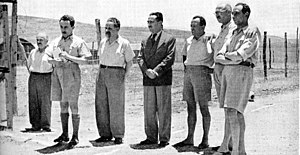Operation Agatha
| Operation Agatha | |
|---|---|
| Part of Jewish insurgency in Palestine | |

Zionist leaders in Latrun, following the operation. Left to right: David Remez, Moshe Sharett, Yitzhak Gruenbaum, Dov Yosef, Mr. Shenkarsky, David Hacohen, Isser Harel.
|
|
| Operational scope | Operational |
| Planned by | British Mandate authorities |
| Objective | Arrest Zionist underground members |
| Date | Saturday, June 29, 1946 |
| Outcome | Success |
Operation Agatha (Saturday, June 29, 1946) sometimes called Black Sabbath ("השבת השחורה") or Black Saturday because it began on the Jewish sabbath, was a police and military operation conducted by the British authorities in Mandatory Palestine. Soldiers and police searched for arms and made arrests in Jerusalem, Tel Aviv, and Haifa, and in several dozen settlements; the Jewish Agency was raided. The total number of British security forces involved is variously reported as 10,000, 17,000, and 25,000. About 2,700 individuals were arrested, among them future Israeli Prime Minister Moshe Sharett. The officially given purpose of the operation was to end "the state of anarchy" then existing in Palestine. Other objectives included obtaining documentary proof of Jewish Agency approval of sabotage operations by the Palmach and of an alliance between the Haganah and the more violent Lehi (Stern Gang) and Irgun, to destroy the Haganah's military power, to boost army morale and to prevent a coup d'état being mounted by the Lehi and Irgun.
It was a tense time. June 16, 1946 saw the "Night of the Bridges", when the Palmach blew up eight road and rail bridges linking Palestine to neighbouring countries. On June 17, the Lehi attacked railway workshops in Haifa. Shortly afterwards, the Irgun kidnapped six British officers. One officer subsequently escaped and two were released. The Irgun announced that the remaining officers would be released only in exchange for the commutation of death sentences for two Irgun members.
The British Army had, for months, wanted to take military action against the Zionist underground organizations, but had been blocked by High Commissioner Alan Cunningham, who was also particularly opposed to military action being taken against the Jewish Agency. Cunningham changed his mind after the "Night of the Bridges" and flew to London to meet the British Cabinet and army chief Field Marshal Bernard Montgomery in London. Montgomery formulated the plan for Operation Agatha. With reluctance, Cunningham accepted it, hoping that, with the more militant Zionists restrained, the way would be opened to reaching a political settlement with the more moderate (and pro-British) leaders such as Chaim Weizmann. During the operation, in a radio broadcast, Cunningham said: "[The arrests] are not directed against the Jewish community as a whole but solely against those few who are taking an active part in the present campaign of violence and those who are responsible for instigating and directing it ... ."
...
Wikipedia
